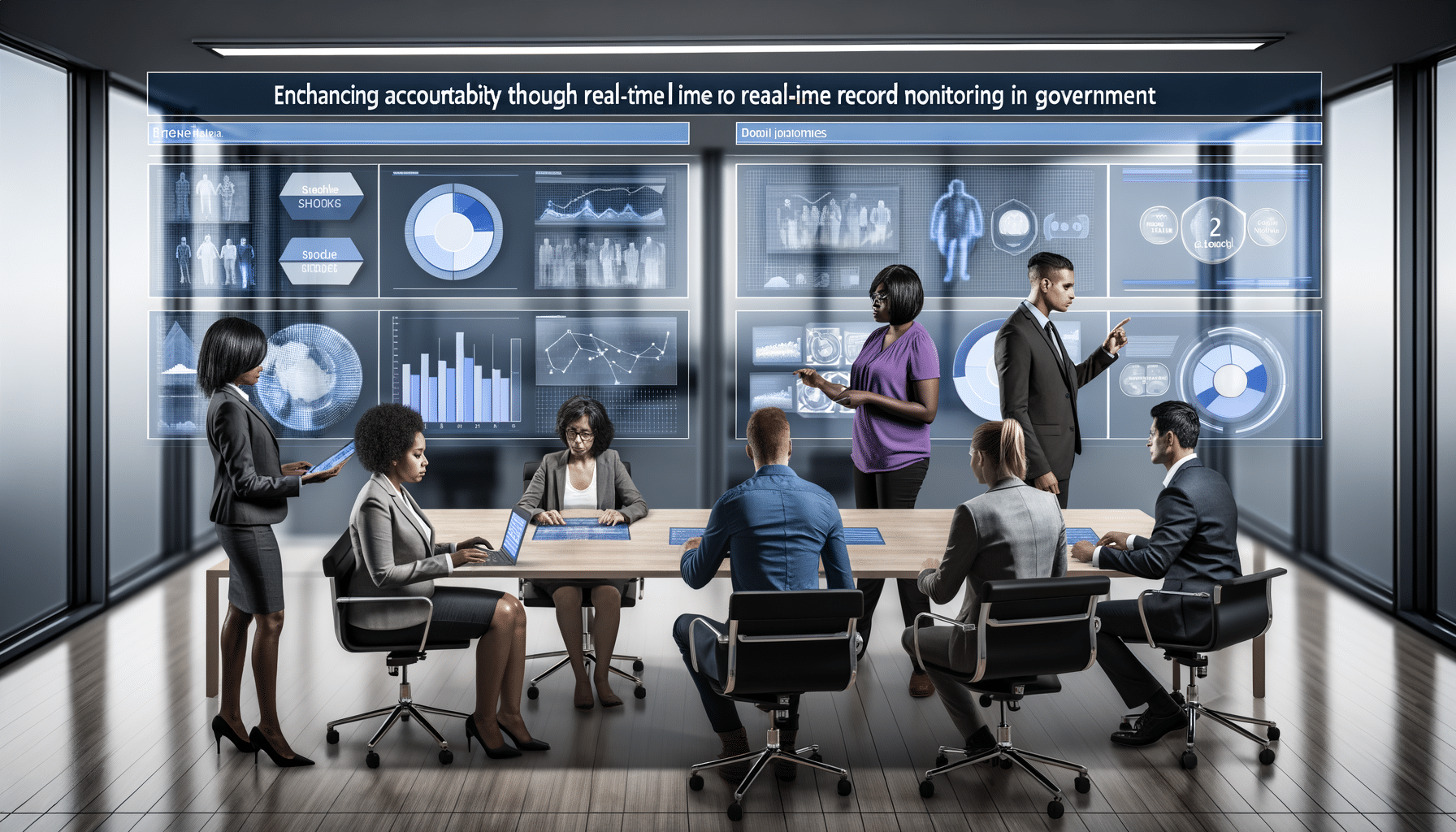- Transparency Practices
- July 7, 2024
Enhancing Accountability Through Real-Time Record Monitoring in Government

In today’s fast-paced world, the demand for transparency and accountability in government operations is at an all-time high. As someone deeply invested in leveraging technology to transform the way we maintain records, I have seen first-hand the potential of real-time monitoring to enhance accountability and transparency within governmental frameworks. Here’s how we can bring about a revolution in governance using cutting-edge technology like what we offer at RecordsKeeper.AI.
Understanding the Need for Real-Time Monitoring
The traditional methods of maintaining records, often overwhelmed by vast amounts of data, leave room for inefficiencies and human error. These gaps not only make it challenging for government departments to be accountable but also hinder public trust. By deploying real-time monitoring mechanisms, we enable a system that is not just about storing data but actively engaging with it, thereby ensuring up-to-the-minute accuracy and accountability.
Incorporating artificial intelligence and blockchain technology, platforms like RecordsKeeper.AI offer real-time oversight of data, meaning your compliance and audit checks don’t have to be a periodic ordeal anymore. They are a continuous process, reducing scope for discrepancies and offering an honest insight into governmental proceedings.
The Impact on Accountability
When we talk about accountability, it involves more than just filing paperwork. Real-time monitoring means each piece of data entered into the system is instantly verified and validated. Here are some transformative impacts
:
- Immediate Error Detection: Automation helps identify discrepancies instantly, promoting rapid response and correction, which directly feeds into governmental accountability.
- Immutable Records: Leveraging blockchain technology ensures that data, once entered, cannot be altered without leaving a visible trace. This immutability is fundamental in preserving the integrity of records.
- Transparency in Transactions: Every action on the platform leaves an audit trail. Enhanced visibility into who did what and when is essential for internal and public trust.
Case Study: Real-Time Monitoring in Action
An excellent case of effective real-time monitoring can be found in some of the forward-thinking municipalities we’ve worked with. These governments have leveraged platforms like RecordsKeeper.AI to manage land records. Through real-time updates and public portals, any citizen can verify zoning plans or title deeds, dramatically reducing the potential for corruption or mishandling. The result? A more confident public and better-aligned government departments.
Overcoming Resistance to Change
Introducing such cutting-edge measures isn’t without challenges. Resistance can come from various angles — from budgetary constraints to the hesitance in adopting new technology. We’ve learned that the key to overcoming these hurdles is education and demonstrating undeniable value.
Introducing pilot programs allows stakeholders to see tangible benefits, dispelling fears and highlighting the ease of transition. Knowledge transfer remains at the core of adoption, allowing departments to take ownership of the technology and fully harness its potential.
The Future of Government Accountability
As I envision the future, the emphasis will be on tighter integration across departments with workflows that are inherently accountable. The more interconnected our world becomes, the more necessary it is for governments to adapt to technologies that promote real-time monitoring of their records.
Services like RecordsKeeper.AI are not just about filing data; they offer a solution that propels governments toward achieving greater transparency and accountability. By investing in these technologies today, government agencies position themselves better to meet future challenges head-on.
Conclusion: The Path Forward
Real-time monitoring presents a compelling promise to transform governmental accountability and transparency, whether that’s by minimizing errors, ensuring data integrity, or promoting openness. I genuinely believe that the sooner we embrace such technologies, the better positioned we will be for a transparent, accountable tomorrow.
I encourage readers, particularly those in government roles, to explore these solutions actively. Join us in this journey of innovation and for regular updates on how we can collectively transform record management practices, follow me for more insights.
Toshendra Sharma is the visionary founder and CEO of RecordsKeeper.AI, spearheading the fusion of AI and blockchain to redefine enterprise record management. With a groundbreaking approach to solving complex business challenges, Toshendra combines deep expertise in blockchain and artificial intelligence with an acute understanding of enterprise compliance and security needs.
Archives
- December 2024
- November 2024
- October 2024
- September 2024
- August 2024
- July 2024
- June 2024
- May 2024
- April 2024
- March 2024
- February 2024
- January 2024
- December 2023
- November 2023
- October 2023
- September 2023
- August 2023
- July 2023
- June 2023
- May 2023
- April 2023
- March 2023
- February 2023
- January 2023
- December 2022
- November 2022
- October 2022
- September 2022
- March 2019
Want to get more content like this?
Signup to directly get this type of content to your inbox!!
Latest Post
Organizing External Auditor Access
- December 22, 2024
Document Control in Manufacturing Plants
- December 21, 2024
Handling Rush Financial Report Requests
- December 20, 2024
Managing Record Access After Staff Changes
- December 19, 2024





